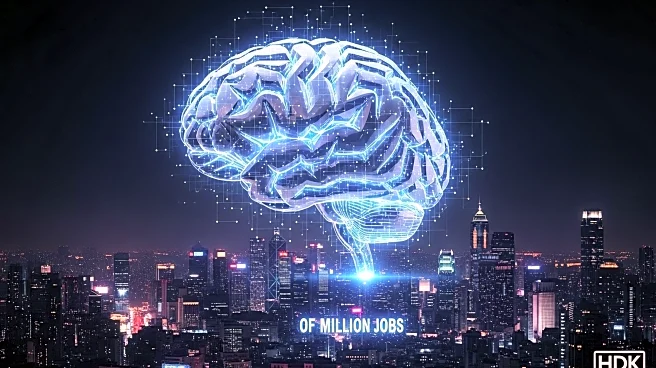What's Happening?
Recent research suggests that nearly a million jobs in London could be significantly impacted by the adoption of artificial intelligence (AI). The study, conducted by LiveCareer UK, highlights that roles such as telemarketers, bookkeepers, and data entry specialists are among those most vulnerable to AI-driven changes. The report also notes a decrease in job advertisements for positions susceptible to AI, with a 38% drop compared to three years ago. The NHS has begun integrating AI into its operations, using it to enhance efficiency and safety in pharmaceutical dispensing. This move is part of a broader government strategy to incorporate AI into healthcare over the next decade. Experts emphasize the importance of adapting to AI by complementing its capabilities rather than fearing job displacement.
Why It's Important?
The integration of AI into various sectors is poised to reshape the workforce, particularly affecting entry-level and repetitive task-oriented jobs. This shift could lead to increased efficiency and safety, as seen in the NHS's use of AI for pharmaceutical dispensing. However, it also raises concerns about job security, especially for roles predominantly occupied by women, potentially exacerbating gender disparities. The reduction in job advertisements suggests a cautious approach by businesses, which may need to rethink their strategies to balance automation with human creativity and judgment. The broader adoption of AI could drive productivity gains, but it necessitates upskilling workers to adapt to new roles and responsibilities.
What's Next?
As AI continues to be integrated into the workforce, companies and institutions may need to focus on training and upskilling employees to handle new technologies effectively. The NHS's strategy includes educating staff on AI capabilities, which could serve as a model for other sectors. Businesses might also need to reassess their hiring practices to ensure they are not inadvertently creating workforce gaps. The ongoing dialogue between employees and employers about AI's role in the workplace will be crucial in navigating these changes. Additionally, regulatory frameworks may evolve to address the ethical and practical implications of AI in the workforce.
Beyond the Headlines
The adoption of AI presents ethical considerations, particularly regarding gender disparities and the potential for increased inequality. As AI takes over repetitive tasks, the focus may shift towards roles requiring human creativity and judgment, potentially altering workplace dynamics. Long-term, AI could redefine job descriptions and career paths, necessitating a cultural shift in how work is perceived and valued. The emphasis on AI as a tool rather than a replacement highlights the need for a balanced approach to technology integration, ensuring that human skills remain central to organizational success.









